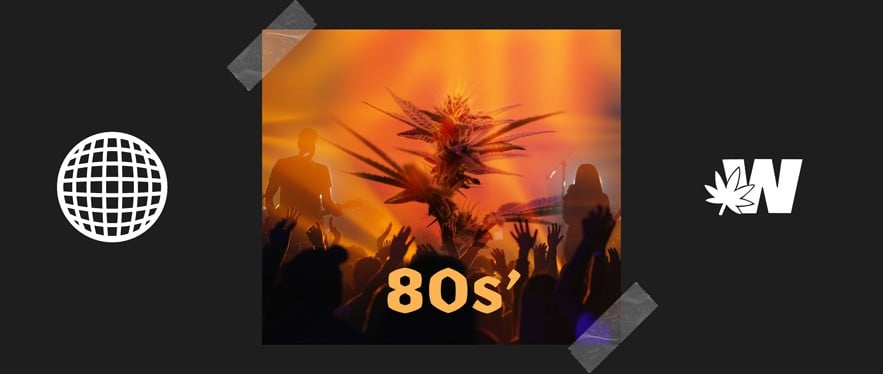
Top 5 80s Rock Bands That Embraced the Weed Culture
The 1980s were a pivotal era for rock music, marked by the rise of hair metal, the emergence of hard rock, and the continuation of classic rock’s legacy. Among the many elements that defined this decade, the use of marijuana, commonly referred to as “weed,” played a significant role in shaping the culture and creativity of several iconic bands. In this exploration of the top 5 80s rock bands that embraced the weed culture, we delve into their music, lifestyles, and impact on the era’s music scene.
In selecting these top 5 bands, we considered three essential criteria popularity, cultural impact, and openness about marijuana use. These bands not only produced chart-topping hits and achieved commercial success but also left an indelible mark on the music and fashion of the 1980s. Moreover, they were unapologetically open about their affinity for marijuana, using it as a source of inspiration and even weaving it into their lyrics and interviews.
To fully appreciate the connection between 80s rock and weed culture, it’s essential to understand the cultural climate of the time. The 1980s was a period of social and political change, marked by a counterculture movement that rejected conventional norms. Marijuana was at the center of this rebellion, and rock musicians, known for their defiance, readily embraced it as part of their lifestyle. Let’s dive into the influence of weed in 80s rock music and the criteria that guided our selection process.
This post is intended as information and for general knowledge only. It is not a substitute for medical advice, diagnosis, or treatment. It is recommended that you talk to a healthcare professional about this before introducing cannabinoids into your daily routine (especially if you have been diagnosed with any medical conditions or are under any medication). It is not recommended to drive or operate any machinery when using cannabis- or hemp-derived products. Use responsibly!
The Influence of Weed in 80s Rock Music
The 1980s witnessed a resurgence of rock music, with bands like Black Sabbath, Bon Jovi, Van Halen, Tom Petty, and many others dominating the scene. As this resurgence occurred, so did the popularity of marijuana within the music industry. Weed became a symbol of rebellion, freedom, and creativity, making it a natural companion to the rock genre.

In the counterculture movement of the 80s, marijuana was seen as a way to break free from societal constraints and unleash one’s creative potential. It played a pivotal role in shaping the music and lifestyles of many rock bands, often fueling their artistic endeavors and pushing boundaries. These bands not only smoked weed but openly celebrated its influence on their music and lives.
Criteria for Selection
The criteria we used to select the top 5 80s rock bands that embraced the weed culture were carefully chosen to encapsulate the essence of this era. These criteria are
Popularity
The bands had to have achieved commercial success in the 1980s, with chart-topping hits and significant album sales. This criterion ensures that the chosen bands were not only part of the 80s rock landscape but also left a lasting impact.
Cultural Impact
We considered the bands’ influence on the music and fashion of the time. Their ability to shape the culture of the 1980s was a vital factor in our selection process.
Openness about Marijuana
To qualify for this list, the bands had to be unapologetically open about their marijuana use. Whether through interviews, lyrics, or public statements, these bands embraced weed culture as an integral part of their identity.
Our selection criteria are deeply intertwined with the culture of the 1980s and the role that weed played within it. Let’s now explore each of the top 5 80s rock bands that used weed as an integral part of their journey.
Black Sabbath
Introduction to the Band
Black Sabbath, hailing from Birmingham, England, is often hailed as the pioneers of heavy metal. Formed in 1968, the band’s classic lineup featured Ozzy Osbourne on vocals, Tony Iommi on guitar, Geezer Butler on bass, and Bill Ward on drums. While their roots extend into the late 1960s, their influence continued well into the 80s rock scene.
The Band’s Relationship with Marijuana
Black Sabbath’s association with marijuana was no secret. Their early work often featured dark and psychedelic themes that resonated with stoner rock enthusiasts. Songs like “Sweet Leaf” from their 1971 album “Master of Reality” openly celebrated the joys of smoking weed. Ozzy Osbourne, the band’s enigmatic frontman, was known for his fondness for cannabis, and this affinity frequently spilled into the band’s lyrics and interviews.
In a Rolling Stone interview, Osbourne once candidly admitted, “We used to smoke pot in the morning. I’d say, ‘F*** it, I’ll just have a joint,’ and they’d say, ‘What’s that?’ and I’d say, ‘Just a joint, man.'” This openness about marijuana use became part of Black Sabbath’s image and resonated with their audience.
Impact on 80s Rock Scene
Black Sabbath’s influence on the 80s rock scene cannot be overstated. While their style evolved over the years, their early work, characterized by heavy, downtuned guitars and dark lyrical themes, set the stage for the rise of heavy metal and stoner rock in the 80s. Bands like Mötley Crüe, Guns N’ Roses, and many others drew inspiration from Black Sabbath’s pioneering sound and the rebellious spirit associated with it.

Black Sabbath’s unabashed celebration of weed culture helped normalize marijuana use within the rock community, paving the way for subsequent bands to embrace this aspect of the counterculture movement.
Tom Petty and the Heartbreakers
Introduction to the Band
Tom Petty and the Heartbreakers, formed in Gainesville, Florida, in 1976, brought a unique blend of rockand Americana to the 80s music scene. Led by Tom Petty’s distinctive voice and songwriting, the band quickly gained recognition as one of the era’s defining acts.
The Band’s Relationship with Marijuana
Tom Petty, known for his laid-back demeanor, was open about his use of marijuana throughout his career. In songs like “You Don’t Know How It Feels,” Petty sings about rolling a joint and finding solace in weed. The lyrics struck a chord with listeners who identified with the relaxed and carefree attitude associated with smoking cannabis.
Petty’s candidness extended beyond his music. In interviews, he often discussed his marijuana use, describing it as a creative catalyst. He once quipped, “I find it to be very creative, stoner music. Not that you have to be stoned to enjoy it, but it’s good stoner music.” This honesty about his relationship with marijuana made Tom Petty and the Heartbreakers relatable to fans who shared similar experiences.
Impact on 80s Rock Scene
Tom Petty and the Heartbreakers brought a different flavor to the 80s rock scene, infusing classic rock elements with a dose of Americana. Their openness about marijuana use added a layer of authenticity to their music and image. In an era where many bands were exploring the boundaries of rock and experimenting with different sounds, Petty and his band stood out for their unpretentious approach.
Their success in the 80s showcased that rock music could be both heartfelt and infused with the spirit of the counterculture, thanks in part to their willingness to embrace weed culture.
Pink Floyd
Introduction to the Band
Pink Floyd, the legendary English progressive rock band, had already established themselves as pioneers of the genre in the 1970s. However, their influence continued to reverberate throughout the 80s. With members like Roger Waters, David Gilmour, and Nick Mason, the band created some of the most iconic and experimental rock music of the era.
The Band’s Relationship with Marijuana
Pink Floyd’s connection to marijuana was embedded in their music and ethos. Albums like “Dark Side of the Moon” and “The Wall” were known for their immersive, mind-bending experiences, often enhanced by the use of marijuana. Songs like “Comfortably Numb” and “Another Brick in the Wall” tackled themes of alienation and conformity, which resonated with the counterculture movement.
Roger Waters, Pink Floyd’s lyricist and bassist, openly admitted to using marijuana during the creative process. He once explained, “I don’t think there’s any doubt about the fact that it expanded my mind, and I think that it expanded the minds of the people that I was working with.” This expansion of creative horizons was evident in their music.
Impact on 80s Rock Scene
Pink Floyd’s impact on the 80s rock scene was profound. While they continued to perform their classic hits from the 70s, their influence extended into the next decade. Their willingness to tackle complex themes and experiment with sound made them an enduring force in rock music.

Pink Floyd’s music, often enjoyed alongside marijuana, became a soundtrack to the counterculture’s search for meaning and escape from the mundane. Their albums transcended traditional boundaries, offering listeners a unique and introspective experience that was often enhanced by the use of cannabis.
The Doobie Brothers
Introduction to the Band
The Doobie Brothers, hailing from San Jose, California, were a staple of 70s rock but also found success in the 80s. Their blend of rock, pop, and soul made them a beloved and enduring act in the music industry.
The Band’s Relationship with Marijuana
The band’s very name, “The Doobie Brothers,” is a nod to marijuana culture. A “doobie” is a slang term for a marijuana cigarette, and this choice of name made their stance on cannabis clear from the start. While the band’s music wasn’t explicitly centered on marijuana themes, their name and laid-back California vibe resonated with the weed culture of the era.
Impact on 80s Rock Scene
The Doobie Brothers’ impact on the 80s rock scene was a testament to their timeless sound and attitude. While their 70s hits like “Listen to the Music” and “Long Train Runnin'” remained staples of classic rock, their music continued to find new audiences in the 80s.
The band’s association with marijuana culture, evident in their name, connected them to the counterculture movement. It reminded fans that rock music and marijuana were inseparable elements of a broader cultural shift that had its roots in the 1960s.
Neil Young
Introduction to the Artist
Neil Young, the Canadian singer-songwriter, and musician, was a solo artist who made a significant impact on the 80s rock scene. Known for his distinctive voice and introspective songwriting, Young had been a prominent figure in the music industry since the 1960s.
The Artist’s Relationship with Marijuana
Throughout his career, Neil Young was known for his openness about his marijuana use. In songs like “Roll Another Number (For the Road),” Young sang about his fondness for getting high, a sentiment that resonated with many of his fans. His music often had a raw and unfiltered quality, which some attributed to his marijuana use.
Young’s dedication to advocating for the legalization of cannabis further solidified his connection to weed culture. He used his platform to push for reform, believing that marijuana could have medicinal benefits and should be decriminalized.
Impact on 80s Rock Scene
Neil Young’s influence on the 80s rock scene was both musical and cultural. His willingness to address personal and societal issues through his music struck a chord with audiences who appreciated his honesty and vulnerability. His advocacy for marijuana reform also aligned with the counterculture’s push for change.
Young’s ability to remain relevant in the 80s while staying true to his roots made him an enduring figure in the rock and weed culture. His music continued to inspire listeners and provided a soundtrack for those who sought to challenge the status quo.
Conclusion
In the 1980s, marijuana and rock music converged to create a cultural movement that celebrated freedom, creativity, and rebellion. The top 580s rock bands and artists that embraced the weed culture—Black Sabbath, Tom Petty and the Heartbreakers, Pink Floyd, The Doobie Brothers, and Neil Young—left an indelible mark on the music scene of the era. Their openness about marijuana use, whether through lyrics, interviews, or their very names, connected them to the counterculture movement and helped shape the music of this vibrant decade.
As we reflect on the significance of these bands and artists, it becomes clear that the influence of weed culture in 80s rock music was not merely a footnote but a defining aspect of the era. It provided a backdrop against which musicians could explore new frontiers of creativity and challenge societal norms. In doing so, these iconic figures contributed to a musical legacy that continues to resonate with audiences today, reminding us of the enduring connection between rock and cannabis.

Also Interesting:
















